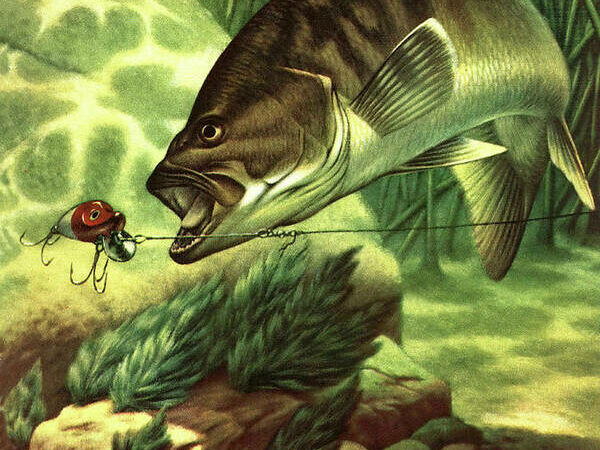The Lost Art of Shooting Running Game
WE GATHERED around a square of turf in the dark with a cold firepit in the center and small open-faced huts on two sides, their openings facing the middle. The other side of the square was a patch of dirt.
This was where the trucks and vans that had ferried us to this spot in the Polish countryside were parked. The large field surrounding us had trees along its edge that showed ink-black against the outline of the still-dark sky. The hint of dawn in the east was muted by clouds.
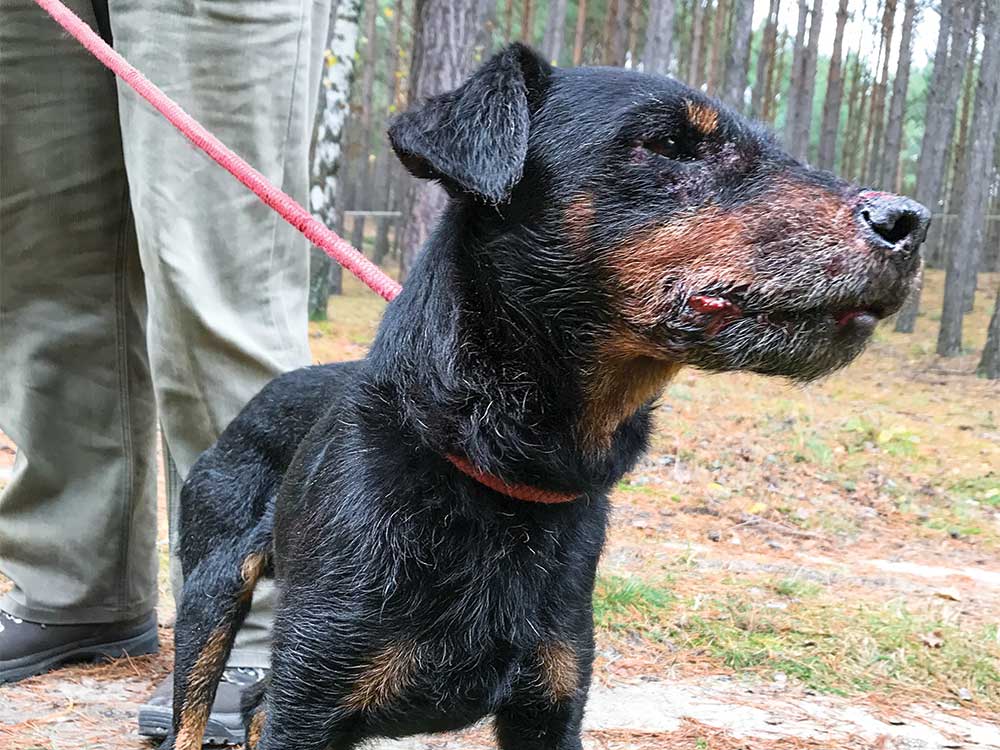
We were a polyglot band of hunters. English was the language most of us had in common, though it was delivered in thick accents that originated in Italy, France, Poland, Norway, Germany, Ireland, New York, and Texas.
As far as I could tell, the beaters and dog handlers, with their fierce-eyed terriers and hounds of mixed parentage, didn’t speak any English. We communicated with nods and friendly gestures. Cigarettes were offered, and in my case declined, smoking being one of the few vices I have not embraced.
This was the first day of a traditional European driven hunt, and to kick it off, we were ushered into two lines facing each other—hunters in one, beaters in the other. A man stood to the side, raised a large circular brass horn to his lips, and played a song that combined short, sharp blasts and longer, soulful notes that carried easily in the air and resonated in my chest. Though we were in Poland, that song, both melodic and martial, would be instantly familiar to hunters in France, Germany, and other parts of Europe. It signaled the start of the hunt.
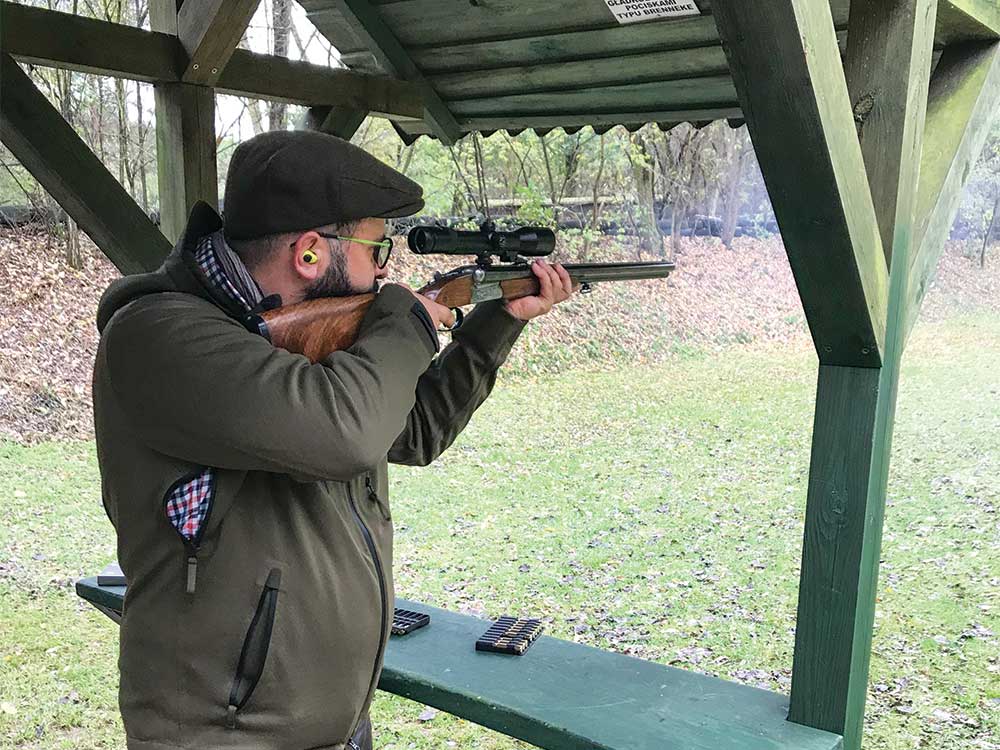
Before we loaded up in the boxy Honker trucks to head to the first drive, the hunt master gave us a lecture on the rules — the very extensive rules — of the hunt, which drove home the complexity and danger of what we were about to do.
Ready, Aim…
You’ve heard jokes about circular firing squads, no doubt. Change the shape from a circle to a rectangle with shooters along three sides, and beaters starting at the open end and then traversing the length of the rectangle, and you have a pretty good idea of what these driven hunts look like.
Inside the drive — meaning the area contained within the rectangle — we were allowed to shoot at “ground” game, which included boar, foxes, badgers, and other short-legged animals, provided they were within 40 meters of our positions and within the shooting angles that the guides indicated when we were dropped off in the woods.
“Camarade,” my guide would say in pidgin French, pointing through the woods to where the hunter on my left would be standing. “Camarade,” he repeated, pointing toward the hunter on my right, giving me my boundaries for shooting inside the drive. Then he’d turn and face the woods behind us and spread his arms wide. “Dobry. Okay.” Outside the drive we could shoot everything, including deer.
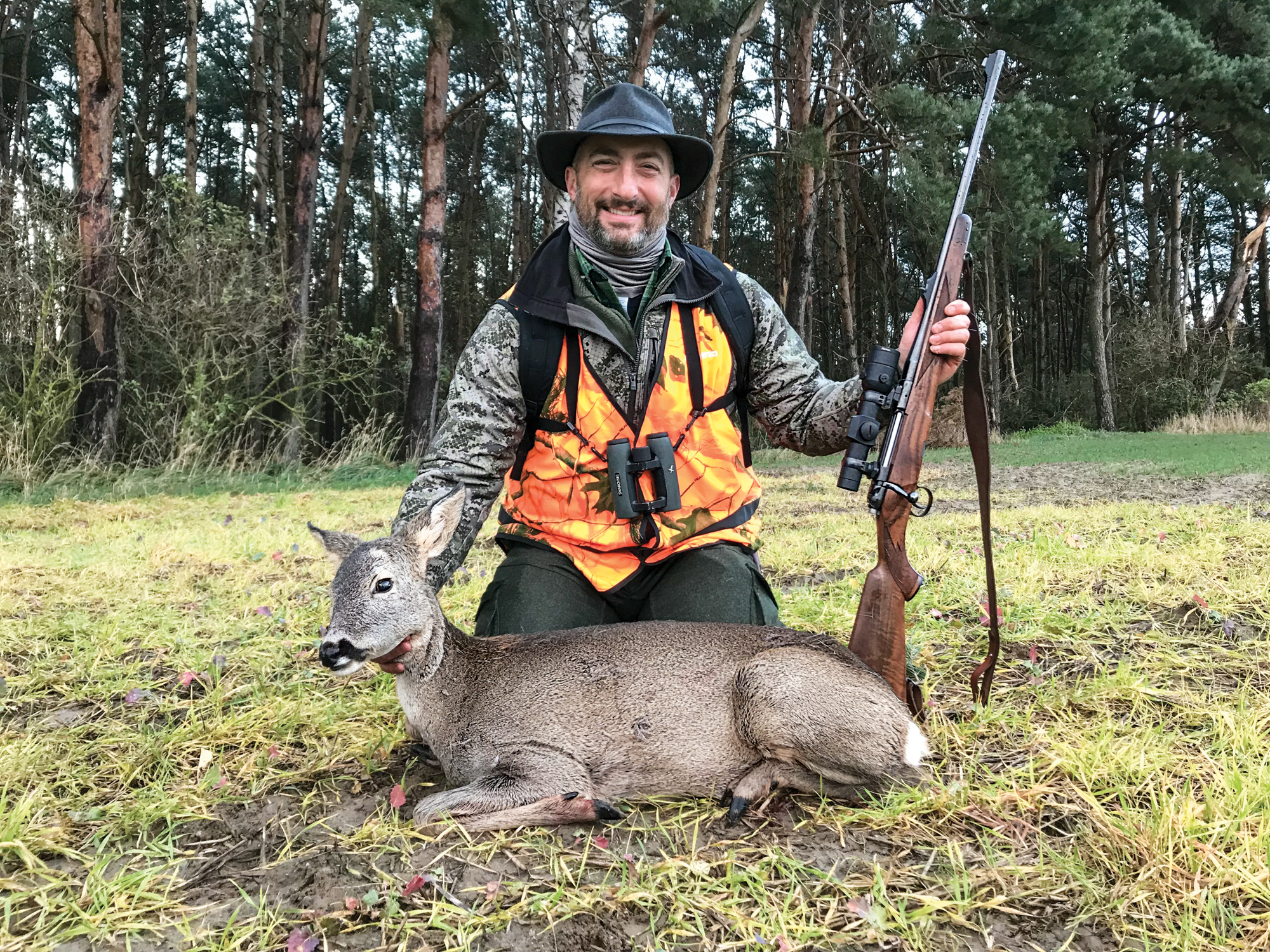
Well, not exactly everything. During the hunt master’s lecture, he enumerated the restrictions on game. No sow boar leading little ones. No red deer stags with crowned points or spike antlers. Shoot all the red deer and roe deer hinds (females) you want. But absolutely no roe deer bucks. This last one was tricky, as the roe deer, which rut in June and July, were dropping their antlers, so a lack of bone on the head wasn’t sufficient to tell the boys from the girls. Each deer would require a closer look. Got it? And don’t forget — everything will be running like hell.
On the Move
Shooting at running game used to be a standard part of the American hunter’s skill set. The guns they carried — lever actions, old semi-autos like the Remington Model 8, and sporterized military turn-bolts — excelled at this task.
We live in a different world today. The mere mention of shooting at running game during a hunter’s ed class would induce chest-gripping seizures among the gray-haired corps of instructors. I get why this is, but those old skills, like many other traditional exercises in woodsmanship, have atrophied and our hunting culture is the poorer for it.
We had to take a shooting test the day before our hunt in order to be allowed to participate. We shot a running boar target at 100 meters, going left to right and right to left, and had to go five for five in the vitals to pass and get a hunting license.
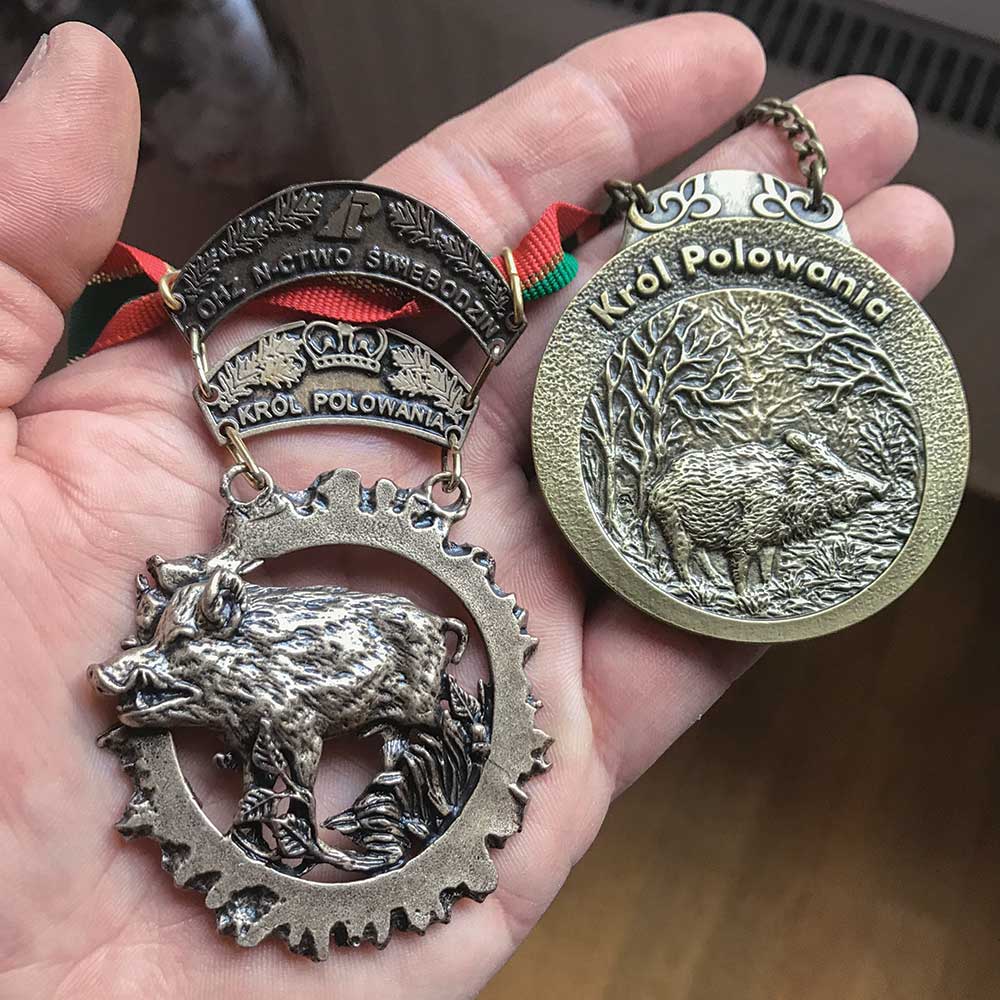
The shooting isn’t difficult with the right technique. Your mom would be happy to know the key is good posture and standing up straight. The goal is to have a smooth, even swing so you can track the target, establish the correct lead, and pull the trigger. Standing straight minimizes the vertical wobble of the barrel and lets you focus on the horizontal motion of the rifle. If you hunch over in a quasi-tactical stance, you’ll have less control over your muzzle. Do some dry-fire practice and see for yourself. Learning the right lead is a matter of time in the field. A good rule of thumb is to put your vertical crosshair in line with the boar’s ear, but, as with wingshooting, there are too many variables to give a single correct answer. No matter what, good trigger control and follow-through are critical. Keep that barrel moving after the shot.
King for a Day
We drew cards to determine our stands, and that first day I shot a couple of boars as they charged through the forest. The sounds of dogs barking, beaters yelling, and gunfire echoed through the woods as other hunters saw game.
During the evening’s ceremony, the animals were laid out on pine boughs with the sprigs of leaves that had been placed in their mouths in the field, a symbolic offering of a last meal. The horn player’s anthem signaled the end of the hunt and asked for the blessing of the forest. The quaintest element of this ritual was the crowning of the King of the Hunt — an honor that this day was bestowed upon me because I happened to shoot a mangut, an unusual furbearer also called a racoon dog. While not rare, it is a secretive animal, and my shooting one caused quite a stir among the guides and beaters. That night back at the house where our group was staying, we filled shot glasses with icy vodka and toasted each other and the animals once again.
The next morning, I was posted up on a logging road for the first drive of the day. Some small boars were running in front of me through the brush but were too quick for a shot. I saw movement to my left and spotted a set of wide ivory-tipped antlers coming toward me, bobbing up and down above the leaves. The stag stepped clear of the brush about 20 yards away, its multi-pointed rack a thing of glory. I willed myself to keep still, and it came closer and then made eye contact. The stag stiffened, lowered its haunches, and rocketed through the woods behind me, outside the drive. I kept the muzzle of my rifle pointed toward the ground. The cost of that regal head was beyond my means.
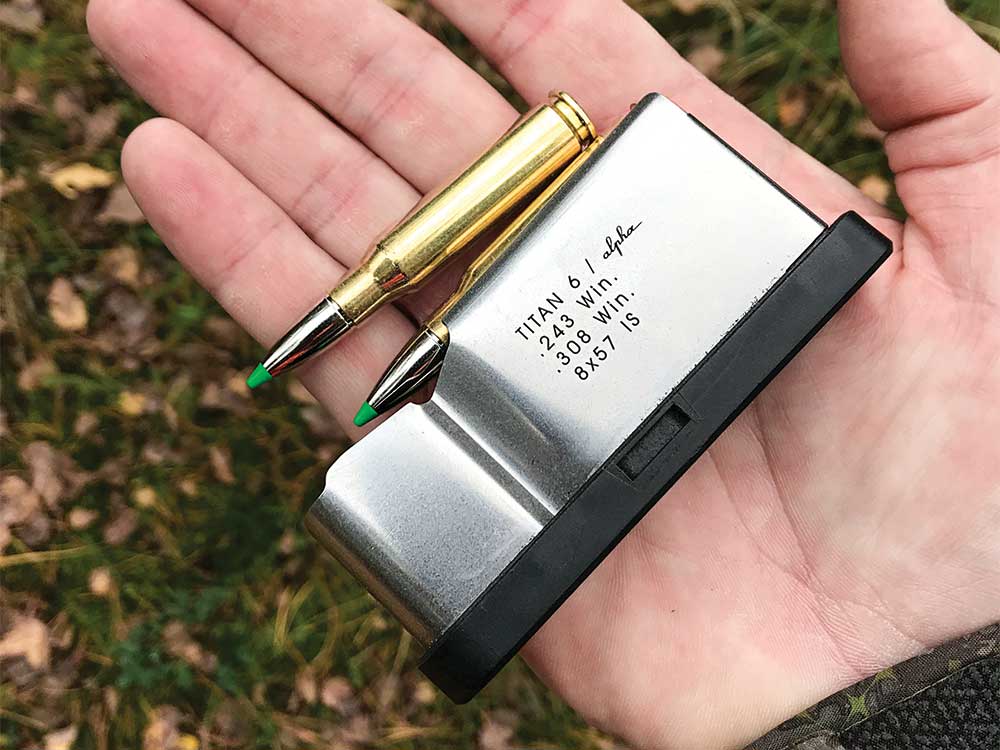
That afternoon, a roe deer hind ran by me. A look through my binocular confirmed her sex and I mounted the gun, swung the red dot in front of her outstretched head and rolled her with a single shot.
I used a couple of different rifles on the hunt, one a .308 from the Austrian company Roessler called the Titan 6, the other a Heym SR21 in 9.3×62 topped with an Aimpoint Hunter red-dot. Both bolt guns were fine choices for this driven hunt, though I felt the Heym, chambered in the heavier cartridge with the non-magnifying optic, was ideal, particularly for the larger boars.
My fellow hunters and I were shooting some of Norma’s newest ammo at the time — the TipStrike and EcoStrike series. The TipStrike bullet is a polymer-tipped projectile, designed for rapid expansion on big game. The EcoStrike, is an all-copper bullet constructed to retain nearly all its weight while penetrating deeply and offering reliable expansion at various impact velocities. I was particularly impressed by the EcoStrike, which has a boattail and a recessed waist in the middle — to reduce the amount of bearing surface on the rifling — both of which contribute to better accuracy.
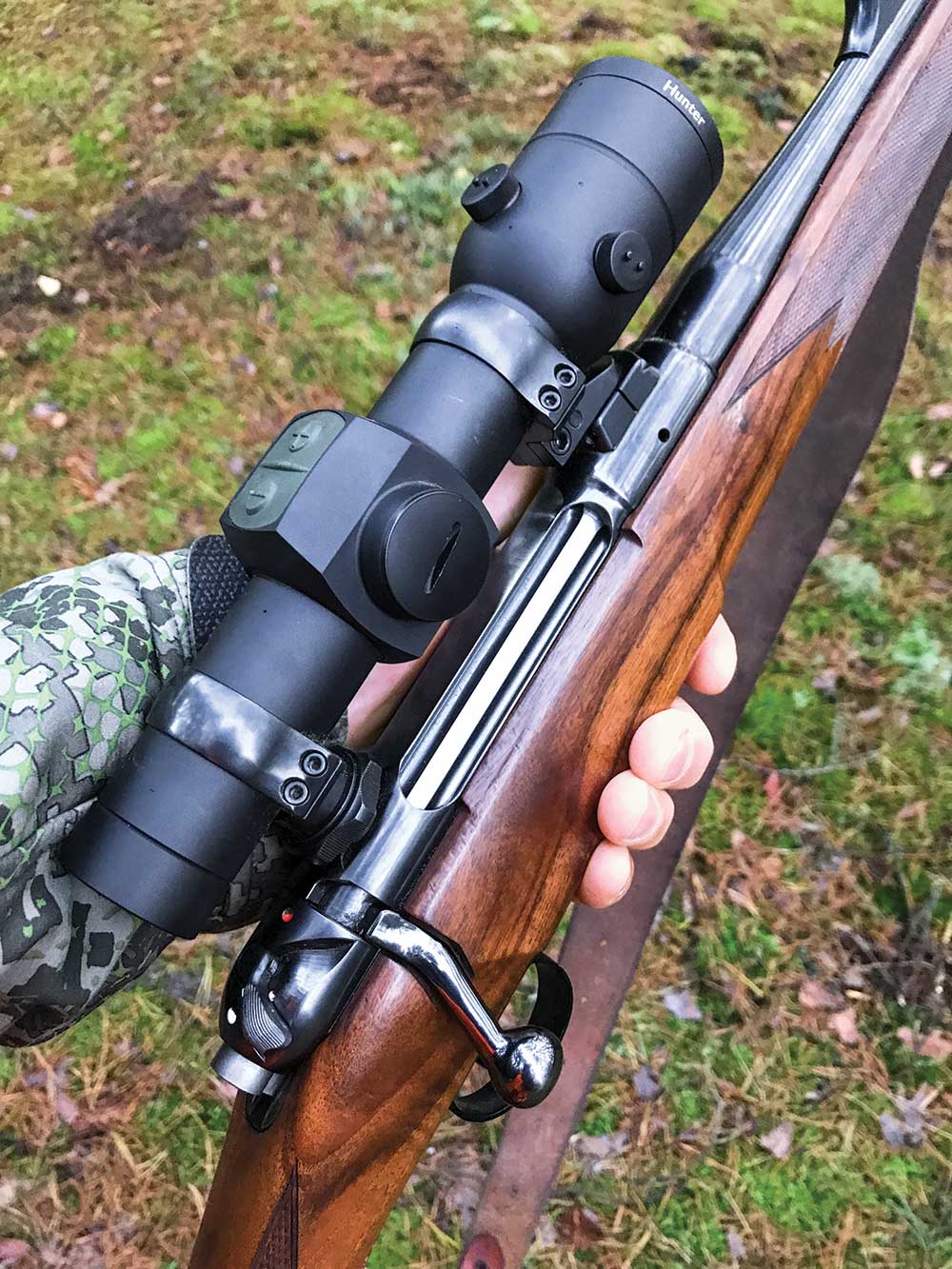
Norma is an interesting study in contrasts. On the one hand, it makes outstanding ammunition that rivals any of our best domestic makes. On the other, the company is modest to a fault, embodying a Scandanavian humility that seems to prevent it from crowing about its products. It is safe to say that Norma makes the best ammunition American hunters have never heard of.
True to form, the ammunition performed superbly. I was able to make some long shots — between 100 and 200 yards, on roe deer hinds and boars, including one massive 300-pound male — that tumbled them with authority.
Last Hurrah
Not all the shots were at such distances. On the last drive of the last day, a boar escaped the drive with a string of dogs in tow. The dogs bayed the boar in an open field, and once the horn sounded to indicate that the drive was concluded and we could move from our posts, I walked behind the hunter next to me to watch him finish off the animal.
I slung my rifle over my shoulder so I could video the end of the hunt on my phone. It proved to be a foolish move. As my friend walked toward the boar, it spun and charged, and he lost his footing, fell over, and was unable to take a shot. The dogs drove the animal right toward me, and once the hog spotted me, I became the focus of its wrath.
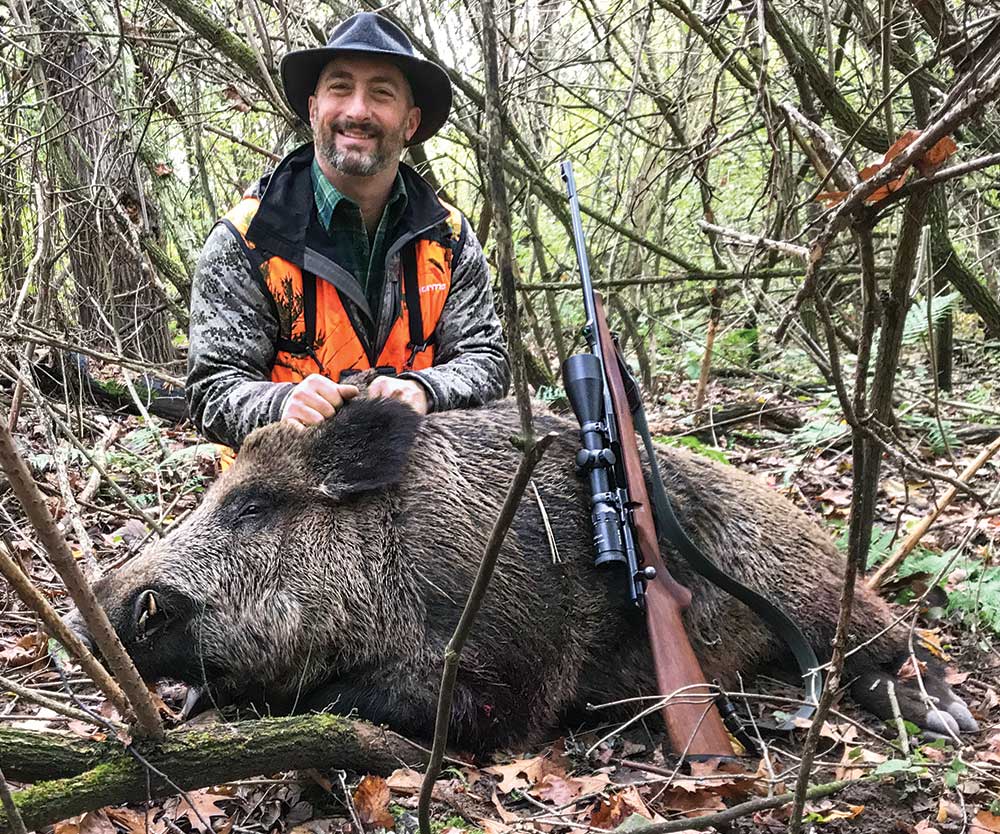
It charged me three times in a matter of seconds, and each time I jumped to the side, avoiding its tusks. During this circus of snarling dogs and irate pig, I managed to put away my phone and unsling my rifle. It charged once more and I circled to the side and put a bullet through its ear, nearly parting its stiff hair with my muzzle.
We had a lot to celebrate that last night. Toasts to the animals. Toasts to the friendships made. Toasts to the end of a great hunt. And from me, a toast to that last boar, and to the hunting gods, for an experience I’ll never forget.
This story originally ran in the Fall 2018 issue.
The post The Lost Art of Shooting Running Game appeared first on Outdoor Life.
Source: https://www.outdoorlife.com/how-to-shoot-running-game/



